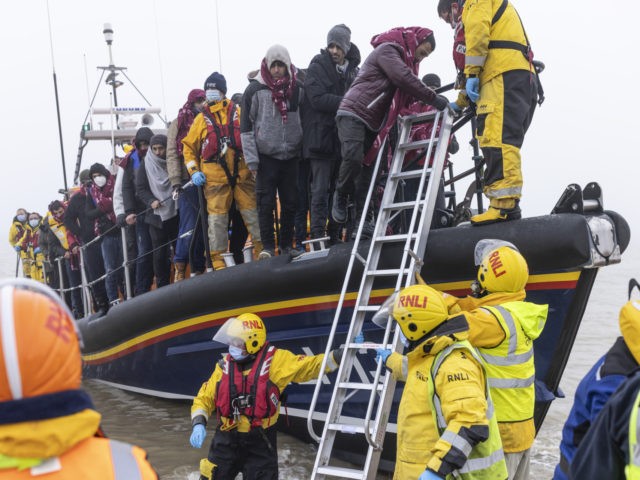British government defence minister James Heappey has admitted that the Royal Navy will not be blocking migrant boats or making arrests as the Channel crisis continues unabated — but claims operations in the waterway are “already pretty successful”.
Heappey, a junior minister at the Ministry of Defence led by Ben Wallace, told LBC radio listeners that the Royal Navy’s much-trumpeted new role in the Channel will largely be one of “command and control”, and that the navy’s “platforms sit too high above the water” for them to be able to bring boat migrants aboard.
Incredibly, the Tory politician claimed that “the reality is that the operation in the Channel is already pretty successful” — sparking incredulity from LBC’s Tom Swarbrick.
“I’m slightly blindsided by the idea that the highest number of people crossing the Channel can be deemed as pretty successful,” Swarbrick said, prompting a visibly agitated Heappey to complain about not being allowed to answer in full.
The politician went on to suggest that the authorities’ efforts against boat migrants were successful insofar as “97 per cent of the dinghies that go into the water are identified, observed and are tracked as they move towards the UK”.
“So the measure of ‘pretty successful’ is ‘we can see ’em’?” Swarbrick asked, prompting a nervy “uh” from the defence minister and another complaint about being interrupted, although given more time to speak he never directly addressed the question.
Asked directly how many of the 97 per cent of migrants detected land regardless — as boats intercepted at sea by the British authorities have never been turned back in all the years since the government first declared Channel crossings a “major incident” in 2018 — Heappey claimed he did “not have that off the top of my head.”
Heappey suggested that the government’s Nationality and Borders Bill, which has been grinding through Parliament since last July, will make it easier to arrest migrants in the Channel or on landing, but went on to admit that Royal Navy personnel would not be doing it due to legal considerations.
Members of the public might be forgiven for thinking that the long-awaited borders legislation may not actually be effective in any case, however, given judges recently overturned the convictions of some of the very small number of migrants taken to court for piloting Channel boats, and the Crown Prosecution Service (CPS) said all the way back in June last year that it would no longer bother pursuing most illegal entrants even under existing legislation.
The Priti Patel-led Home Office’s reported plans to stop disclosing daily crossing figures has also shaken some voters’ faith that the government intends to actually tackle the long-running problem instead of trying to “bury” it.

COMMENTS
Please let us know if you're having issues with commenting.